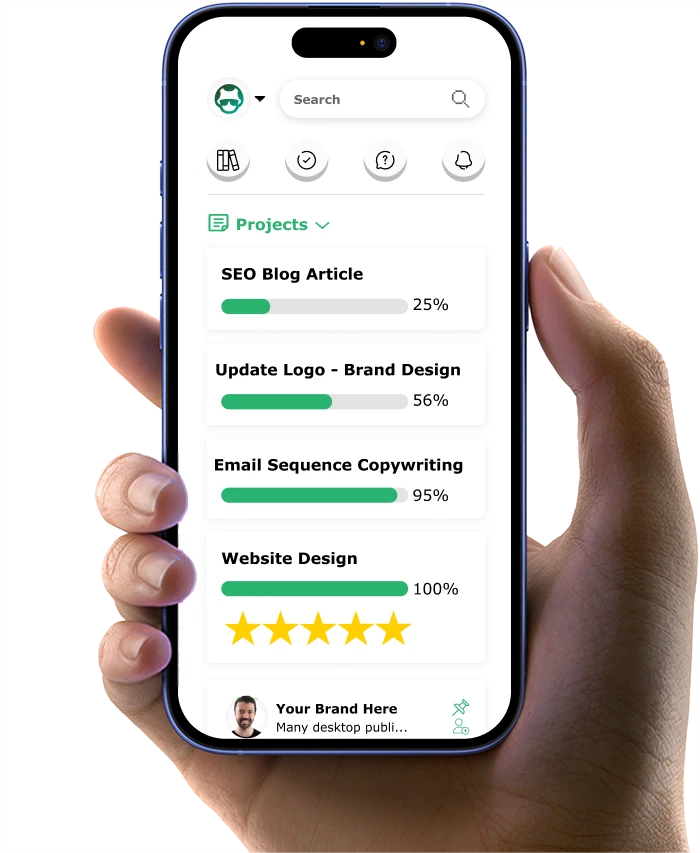17 Easily Avoidable Startup Mistakes You Should Know

Matt Ackerson, the CEO of Growbo, has that same entrepreneurial spirit that many of our clients and readers have.
Back in the day, he became curious about why startups fail so often.
And with that, he bought the domain name for a website named Failedpreneur.com. (I’m pretty sure he coined the term.)
His intention was to dedicate a website to discussing the most common startup mistakes. And what we can do to avoid them.
Although Matt never got around to building the site, this resource serves as a spiritual successor to it.
Moreover, there’s a clever website with the same idea, called Failory you can check out sometime too if you want. There’s even a “Graveyard” tab in the site menus.
Now, for anyone with an entrepreneurial mindset, this resource is for you.
After going over this resource, you’ll come away with:
- 17 of the most common mistakes made by startups
- Plenty of real-world examples of startups tripping up with mistakes
- What you can take away from the mistakes of other startups — and use your awareness of the mistakes to your advantage.
So let’s dive right into the first common startup mistake ...
Want to delegate all your marketing and funnel work done—without the headaches of hiring? Download our free guide: 33 Marketing Projects You Can Delegate to Growbo and discover how to save 100+ hours a month, grow faster, and scale without the overhead.
#1 Common Startup Mistake: Undiversified Customer Acquisition
Back in 2011, a Y Combinator startup by the name of Tutorspree was launched.
With the platform, parents would seek out qualified tutors for their children.
Within 2 years, Tutorspree had over 7,000 tutor sign-ups and raised nearly $2 million in funding from big-time investors such as Sequoia Capital.
It was well on its way now, right?
What common startup mistake could they have possibly made?
According to a blog from one of its founders, Aaron Harris, Google made an algorithm update in 2013 that cut their traffic down by 80%!
He says that essentially all their customer acquisition tactics stemmed from SEO.
In other words, they focused way too much on just SEO.
To summarize, Harris says …
“SEO cannot be the only channel a company has, nor can any other single channel serve that purpose. There is a chance that a single channel can grow a company very quickly to a very large size, but the risks involved in that single channel are large and grow in tandem with the company.”

Moving on, let’s look at the second common startup mistake.
#2 Common Startup Mistake: Not Raising Enough Capital
As far as common startup mistakes go, underfunding is a recurring theme.
In a report by CB Insights, the top reason why startups fail is because they can’t raise new capital.
In the report, 38% of failed startups cite this reason.
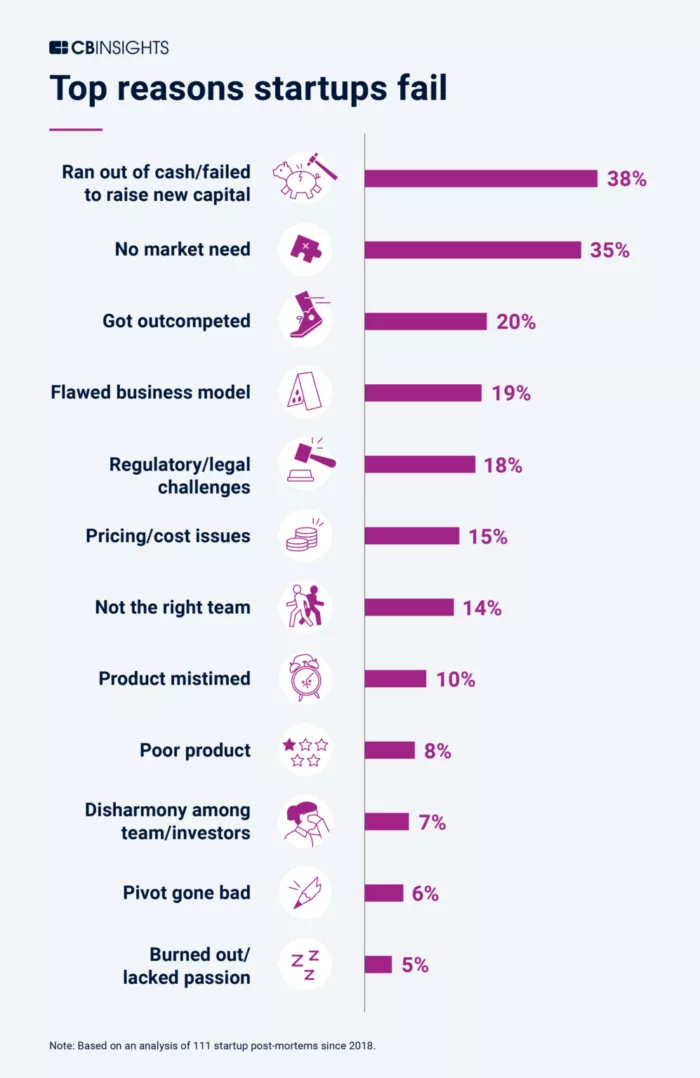
Before starting a new business, don’t go in without a financial plan.
Talk to investors about your ideas before you work so hard.
Get an idea of how venture capitalists will respond to your product or service.
Sadly, without adequate capital, your business idea can only go so far.
#3 Common Startup Mistake: Choosing a Controversial Industry
In today’s world, businesses are held to a high level of scrutiny when it comes to social issues.
The cocoa industry is chief among them.
Hey Tiger marketed itself as an ethical chocolate brand while simultaneously being in an industry known for using child labor.
It’s a tough place to be in.
Although the company combated unethical practices in the cocoa industry, it proved to be too much for Hey Tiger. They were spending so much on social issues that the startup became unprofitable.
And as a result, the Australian startup had to close shop after just three years.
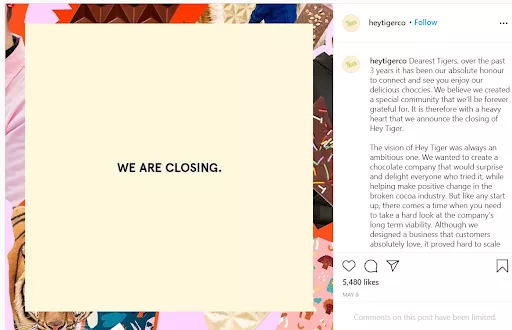
According to Australian newsite Broadsheet, Hey Tiger had to sell its stock 40% off.
#4 Common Startup Mistake: Entering an Oversaturated Market
Imagine receiving $1.75B in funding from huge companies like NBC, Universal and Warner Brothers. Then going bankrupt within a year.
Pretty wild, right?
Well, according to Variety, streaming company Quibi did.
The thing is, there’s already so many other streaming options that offer premium television.
For example, HBO Max came to the scene in May 2020 around the same time as Quibi. With such a household name and an enormous backlog of quality television, how could newbie Quibi compete?
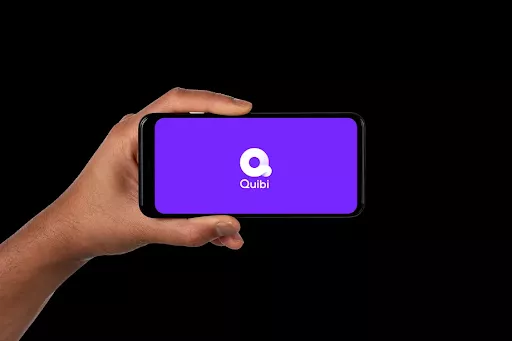
Not surprisingly, most people in the U.S. hadn’t even heard of Quibi leading up to its April launch, according to Statista.
Perhaps, they could’ve used Growbo’s digital marketing solutions to raise brand awareness.
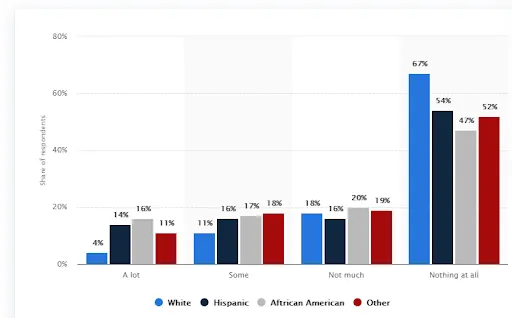
According to the Wall Street Journal, Quibi had to shut down operations just 6 months after launching. (Is that a record?)
#5 Common Startup Mistake: Not Using Competent Technology
According to Failory, tech problems account for 6% of startup failures. And Failory obtained that statistic from interviewing 80 founders of failed startups.
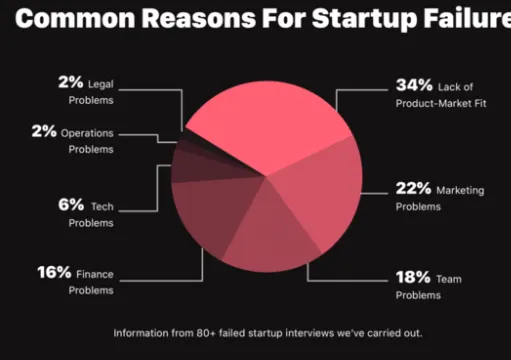
In one case, accounting software startup ScaleFactor found out the hard way that you can’t run a startup when the tech isn’t delivering.
Although their platform promised automating the accounting for SMEs, their AI was erroneous.
According to Forbes, one small business owner by the name of Lindsey Reinders lost $17,000 in one month due to a software error. And she was never fully compensated by SaleFactor.
“If you’re one of the investors that gave these clowns $100 million ...you should know they’ve flushed it down the toilet with poor product and poor service”.
— Lindsey Reinders

It turns out, most of the number crunching was being done by an outsourcing agency in the Philippines.
Not only does that contradict the entire marketing pitch of SaleFactor, it also opens up more possibilities for legal trouble.
Clearly, the startup lacked the proper technology to realize their vision. And it’s okay to admit that.
Unfortunately for ScaleFactor, this mistake led to its demise in mid-2020 after raising over $100 million in investments.
#6 Common Startup Mistake: Trying To Be Two Things at Once
“[Startups] can be either a good food company or a good delivery company, but I don’t think anyone has been able to do both.”
— Pascal Rigo, San Francisco Chronicle
Munchery, like so many startups, was founded in San Francisco.
So what was the company? It was a gourmet food on-demand service.
Customers could rate the food and the chefs after they finished dining.
As its staple, Munchery housed its own highly-esteemed chefs. It was basically a gourmet restaurant on-demand.
But problems inevitably arose as they expanded.
There’s a good reason why 5-star restaurants aren’t marketed as food on-demand apps.
For that target audience, they want to go out and enjoy the setting of a restaurant. And they want to get the most for their money.
Food delivery joints specialize in one thing only: timely delivery.Their food may be “good enough,” but it’s certainly not gourmet.
Munchery could not fulfill its promise of high-quality food and timely deliveries as they opened up to new markets.
In view of this, it’s not exactly a surprise that the most successful brands excel at one thing and prioritize that speciality in its business model.
For me, it’s more like …
Gourmet food.
On-demand service.
Pick one.
#7 Common Startup Mistake: Poor Timing
Another common startup mistake is launching a product or service at the wrong time.
After raising $15 million in funding, virtual reality gaming company Vreal had to shut down its operations in 2019.
With Vreal’s tech, users could view streamers as 3D objects, as if they were in the room with them.
You have to admit, that’s a pretty cool idea. But perhaps a little iffy ethics-wise.
Unfortunately, it was all for naught because the VR market just hadn’t been adopted by enough consumers to make the company proftbale.
In a survey carried out by VR junkie Artillery Intelligence, just 8% of American interwebers used VR in 2017.
And by 2022, it’s expected to increase to 24%.



Maybe Vreal just peaked at the wrong time.
And it’s possible they could have their eyes on a comeback as their website is still up and running.
Either way, it’s a lesson on the importance of making sure the timing of your startup launch aligns with consumer trends.
With that being said, allow me to continue to the next common startup mistake.
#8 Common Startup Mistake: Losing Focus
Once a unicorn and valued at over $1B, e-commerce company Fab is a perfect example of the repercussions of losing focus of your original vision.
At one point, the company was considered the fastest growing startup in the world.
It’s appeal was its focus on the unique designs found on its website.
Moreover, consumers could share their purchases with friends.

Things started going downhill for Fab when co-founder Jason Goldberg decided to take the company in a different direction from what others wanted.
He started taking a path that contradicted the one they were already on — which was insanely successful.
According to former employees speaking to Business Insider, his decision to expand into Europe cost Fab up to $100 million.
See, he got too ambitious too quick.
Already, Fab had a great business model that worked.
In the end, Goldberg sold off Fab to another firm for between $15-30 million, according to The Hustle.
But all the employees had been fired at that point.
Remember,the startup was once valued at over $1B!
As this tale demonstrates, don’t stray away from a business design that’s already working.
#9 Common Startup Mistake: Failure To Use the Right Business Structure
Not having the right legal status can have severe consequences.
For example, if you decide on a sole proprietorship, all liabilities fall on you and you only.
But if your plan is to become a bigger company over time with hundreds of employees, then you must decide between an LLC or corporation.

Your business structure will also dictate how your startup is taxed.
Many startups avoid filing as a C corporation. Consequently, they face higher taxes when it’s not necessary.
Because of the Qualified Small Business Stock exemption, startups in the U.S. can potentially write off 100% of their investment proceeds when it comes time to file their taxes.
Before officially filing your startup, be sure to get legal guidance from a lawyer who specializes in business law in your field.
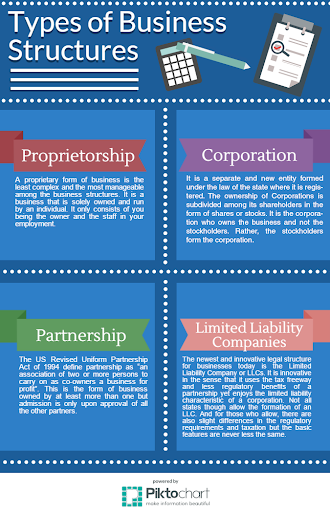
#10 Common Startup Mistake: Choosing the Wrong Domain Name
Content Marketing experimenter GrowthBadger has found that .com domain names are remembered much more frequently than non-.com domains.
On average, .com URLs are 33% more memorable than other domains.
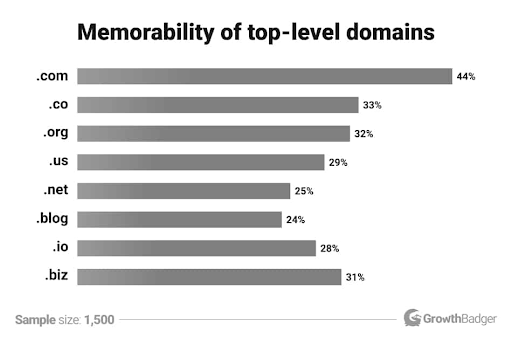
And when people forget the domain, they tend to misremember it as being .com.
Not surprisingly, .com URLs are also hailed as the most trustworthy domains.
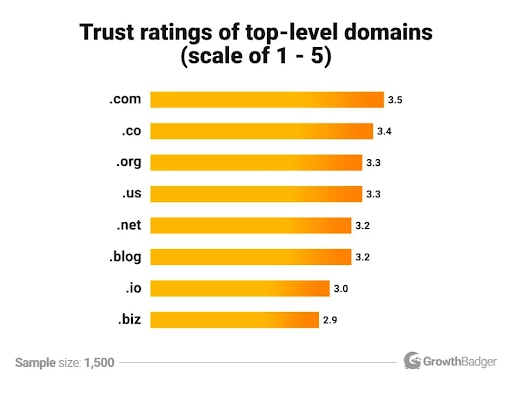
Despite these stats, 33% of startups use domain names other than .com, according to business financial manager Brex.
Granted, some of these non-.com domains are for the alternative .ai domain which is for the AI-focused startups.
And of course, .gov and .org aren’t really suitable for startups.
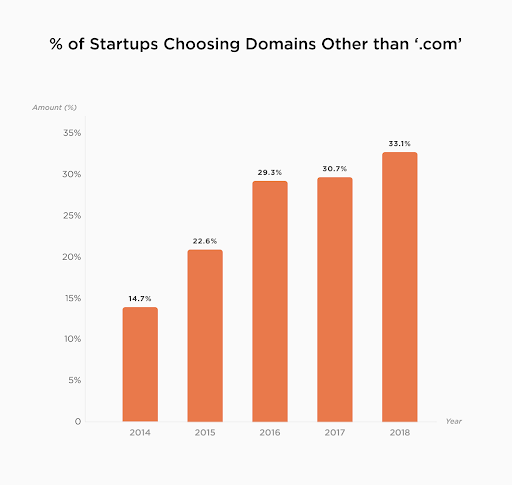
In 2018, 33.1% of all startups used domains other than .com.
Now, let’s see what startups in the most startup-centric cities are using for domain names …
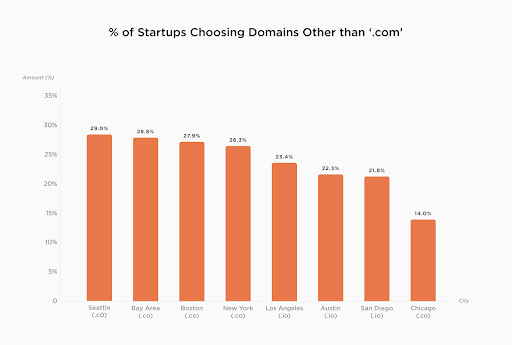
You see that?
The big startup cities are using .com domains more often than average.
And I wonder why.
Easy. Because .com is the best value.
#11 Common Startup Mistake: Pricing Too Low
As a startup, you’re desperate for customer acquisition and retention.
One common startup mistake is trying to do those things by offering a product or service at an absurdly low price point.
For example, Paul Brown, 20-time venture capitalist, knows all too well about the deceptiveness of customer retention.
In his blog article on Lassonde Entrepreneur Institute, he recalls a story where a CFO for one of his startup investment firms was praising a 96% retention rate.
But Brown knew all too well that that’s usually a bad sign. It means your price point is too low.
Imagine buying a lamborghini for $20,000.
With those prices, Lamborghini’s customer retention rate would be 100%.
But it’s not sustainable.
You start paying more than you’re earning.
Setting the wrong price point can lead to your startup’s demise.
Now, let’s proceed to the next section.
#12 Common Startup Mistake: Burn
Another common mistake that startups make is burn.
If you don’t already know, burn refers to spending more money than you’re taking in.
For instance, let’s look at the classic failedpreneur case study of the Silicon Valley startup, Zirtual.
Zirtual was once a rather successful startup that provided small businesses with virtual assistants.
Things were going quite well for some time.
In fact, sales and marketing outsourcer FullFunnel claims to have helped increase Zirtual’s revenue by 500% back in 2015.

But everything went downhill because management didn’t have a good understanding of its inbound and outbound cash flows.
Due to this, Zirtual was spending more than they were making. A common pitfall.
To conclude, she was forced to lay off all her stay-at-home-mom employees and Zirtual got bought out by Startups.co.
What’s the lesson here?
You must design a sustainable business model. Preferably, with the help of financial analysts that are experts in cash-flow management.
#13 Common Startup Mistake: Burnout
If I’m going to talk about burn, I might as well also discuss burnout.
According to CB Insights, burnout is the reason why 5% of startups fail.
In the entrepreneurial world, you’re definitely expected to make some sacrifices. After all, it’s that undying passion that drives so many successful startups.
But at the same time, you must account for your personal health.
If you’re working 15 hours a day every day, that’s probably not a good sign.
Even more, you might lose your interest if you spend too much time on your startup.
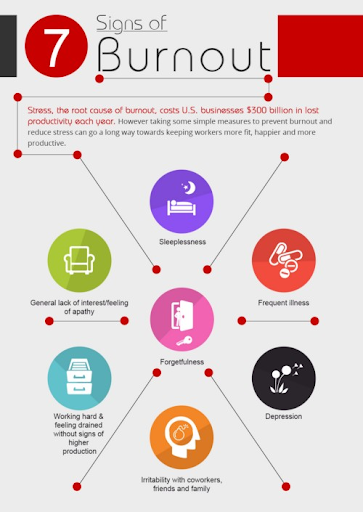
Not only do you have to worry about burnout for yourself but for your employees too.
If you overwork them, they may feel stretched thin or even quit.
As an entrepreneur, you’re going to need effective leadership to avoid losing employees. And even just to communicate with subordinates on how to add more value to the business.
For more on startup management and how to tell your employees what to do, watch our video on the topic which can be found below.
#14 Common Startup Mistake: Making a Bad Pivot
According to startup builder Wilbur Labs, an unsuccessful pivot was the reason why 13.9% of startups failed between 2000 to 2020.
A pivot refers to when a startup drastically changes a core aspect of its business model. In not so many words, you’re saying, “Okay, we messed up big time.”
According to the Startup Genome Report, startups that pivot 1 or 2 times raise 2.5X more money and have a 3.6X better user growth than startups that pivot more than 2 times.

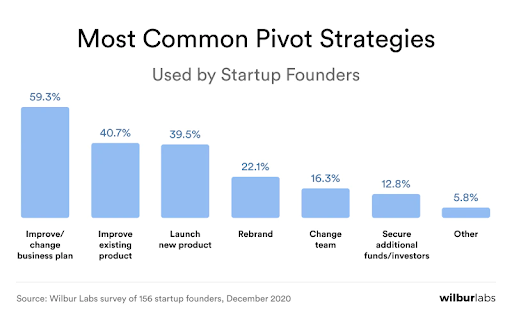
#15 Common Startup Mistake: Not So Great User Experience (UX)
As found by UX design agency Intechnic, 70% of customers abandon purchases if their user experience is subpar.
Moreover, slow-loading websites cost retailers more than $2B annually in lost sales.
For startups, UX design is crucial. It’s your chance to give a first impression.
And in Intechnic’s report, they say that 94% of what a consumer judges a new brand by is design related.
If you mess up your website or mobile app, it could be game over pretty quick.

#16 Common Startup Mistake: Expanding Too Fast
Expanding your startup too fast can have disastrous consequences.
For example, take a look at New York-based pastry restaurant, Crumbs Bake Shop
They had a great thing going. Everyone loved their oversized cupcakes.
And in 2011, Crumbs went public.
But it all took a dark turn when management decided to expand to too many places at once without proper insight.
According to Reuters, Crumbs faced a $28 million deficit by March of 2014.
Management knew that sales were declining by 2011 yet continued to open up in new cities.
#17 Most Common Startup Mistake: Not Finding a Mentor
According to global financial services firm Kabbage, only 22% of small businesses had mentors in their early days.
This startup mistake ties in directly with the previous section about lack of experience.
It’s no coincidence that 80% of CEOs have received some kind of mentorship over the years. That’s according to a Stanford study from 2013.
In other words, nobody is born being a successful business leader. Instead, it takes time and education — learning from the best.
By the way, you’re over 3X as likely to become a top-performing company if you have a mentor, as per TechCrunch.
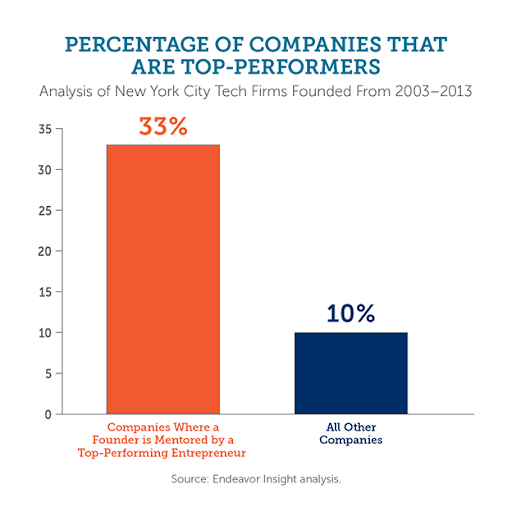
Conclusion
Want to delegate all your marketing and funnel work done—without the headaches of hiring? Download our free guide: 33 Marketing Projects You Can Delegate to Growbo and discover how to save 100+ hours a month, grow faster, and scale without the overhead.
As you can see, there are numerous ways to trip up in the startup phase.
But just by being aware of these 17 common startup mistakes, you’re one step ahead of other entrepreneurs that want to compete with you.
Unless they also read this blog.
The odds are against you as an entrepreneur. The overwhelming majority of startups end in failure.
And one crucial aspect of acquiring and retaining a loyal customer base is effective marketing.
Yet just 57% of startups have a dedicated marketing team, according to Campaign Monitor’s research.
And just 7% rely on agencies or freelancers.
At Growbo, we’ve been helping startups and small businesses prosper through our digital marketing services.
Using our web-based app, you can assign the tasks you want — when you need them done.
From there, we’ll take care of the rest.
And we’d be humbled to know that we’ve had a hand in helping bring the next startup unicorn to the forefront.
Raise More Awareness of Your Startup By Signing Up With Growbo’s 7-day For $7 Trial Today
One last thing.
Have you dealt with any of these common startup mistakes?
Are you dealing with one now?
Let me know below in the comments.
Keep Growin’, stay focused.
Mark



